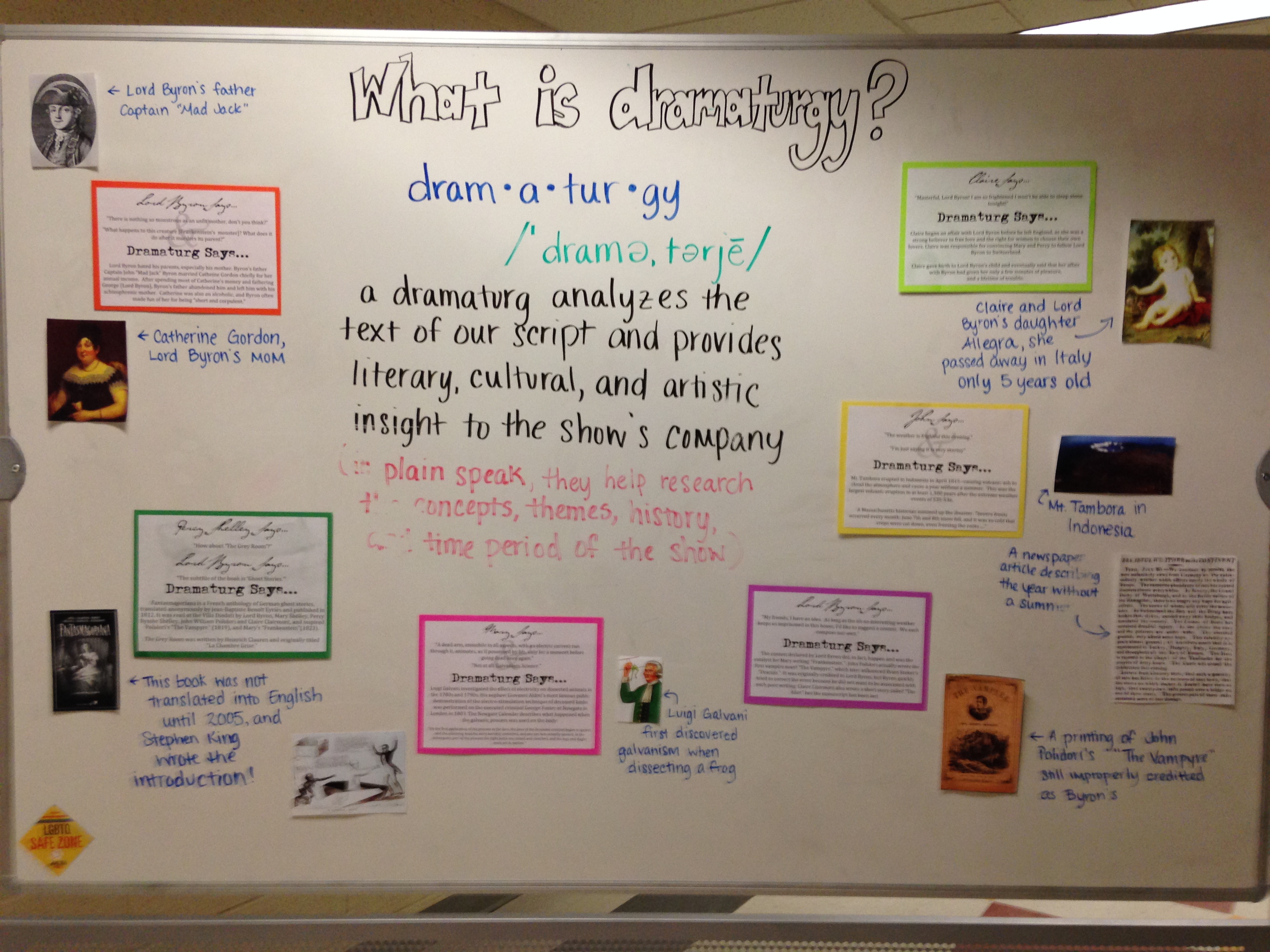This year I am interested in producing “Kentucky Cycles: Fire in the Hole." After speaking to a theatre teacher in TX who had previously produced the show, he discussed how his administration had issues with the alcohol in the show but completely fine with the violence and guns. When I proposed this show to my administrative team, they responded exactly opposite: choosing to be cautious about the violence and guns, but more comfortable with the alcohol.
For both of us, we had to help our administration understand. At the end of the day we want our administration to do their job well, so how do we help our administration help us? Together with my administrative team, we've developed a system that helps us prepare for each show. It's important that we are proactive in our communication, and if you haven't spoken with your administrative team about how you can work together, do it! I highly recommend taking the time to do so.
In our system, I begin by submitting a written proposal for each show I would like to produce, and why. The main questions I answer in the proposal are:
-Why this show? What is the educational value?
-Why now? Why here?
Having this answer in writing helps my administrators look past the titles, and truly understand the merit of a show. It gives my administrators a true heads-up on what to expect and this way they are never surprised by our community's response to a show-- whether it is a good or bad response.
For many of us, it often feels like someone can take issue with practically any show ("Music Man" is about a con artist who has no consequences; "Annie" has a drunk caretaker). Letting your administration know a show's content before it even goes into rehearsal gives your administrative team control because it allows them to make a game plan with you. No administrator likes to receive a complaint about your show and then be unable to respond because they don't know how.
For example, we recently produced Larry Shue's "The Foreigner," where the KKK makes an appearance. It is easy to react and say "KKK? No way!" But knowing that this show is really about overcoming xenophobia and creating a community, that it has parallels with historical and contemporary events, and that it shows the true inter-cultural struggle of America allows everyone to see the bigger picture and see the play's educational merit. By presenting this information in your proposal to the administrative team, you have now prepared them to respond to any complaint: whether the complaint comes when we announce, rehearse, or perform the show.
From the proposal, the administrative team's response to a complaint can focus on the show's positive educational merit and the reasons why we chose to produce this selection. Notice I said "we" chose to produce it, including the administration in that decision. Using the proposal system makes your administration an important part of the process. Even if all they do is sign off and say yes, they have now backed the show. I breathe easy knowing the administration will now have my back because we are all on the same page.
The proposal also allows you and your administrative team to use the same language to respond to any complaint, ensuring we have a united front.
If there is sensitive content discuss the plan for handling the sensitive content with your administrators as part of the proposal. In Don Zolidis’s “Monster,” one of the character’s dies by suicide. Together with our administrative team, we put together a ten-step plan outlining how we were going to handle the content in the rehearsal process. Having this is writing, gave them a response to any parents who were nervous about a script with sensitive content. The plan we created is available here: https://docs.google.com/document/d/1LOezsdklDW6_G9s9oBnNoPrXHKLMBbxCbG1wtfOLUec/edit?usp=sharing
For Larry Shue's "The Foreigner," and Don Zolidis's "Monster," as part of our sensitive content plan, we put ratings on all our production advertisements to help educate our audiences and therefore minimize potential complaints. "Monster" was rated PG-13, and "The Foreigner" PG. Content warnings were placed in all our advertisements to help prepare our audiences for their experience. The one for "Monster" read, "As this show is based on the true events that inspired 'Frankenstein,' it deals with themes of mortality and death. A strobe lighting effect is also used." This was posted at our ticket table, at the bottom of the program page, and all advertisements. This helped our administrators sign-off because they knew that we were providing enough information well in advance to our audience members.
To help our audiences/community understand the educational value of the show, we created great dramaturgical displays. For both shows, we took lines from the show and connected them to real events in history. Example, in "The Foreigner" Reverend David Lee is proud of his relation to General Robert E. Lee, and has a line that says "God helps those who help themselves." This saying is actually engraved on General Lee's sword.
To see how the displays actually looked, check out some examples of our dramaturgical line displays from "Monster":


For each show, we also created an entire tri-fold on the location of the plays: Geneva for "Monster" and Southern Georgia for "Foreigner." Another tri-fold was on each of the show's time periods: 1816 and 1984.
Specific concepts from each show researched as part of the dramaturgy, and so we created a display for those. For "Foreigner" it was xenophobia, the KKK, and David Duke. For "Monster," it was galvanism, the history of women's rights, and "Frankenstein."
These displays were invaluable in educating our audiences and have been incredibly popular. Our audience fills our lobby half an hour before the show starts just so they can explore the displays, and we are going to put out the exhibits for every show we do, sensitive content or no. A surprising side-effect, we also discovered it was a great theatre advocacy piece because it helps quantify how much you can learn from a show and the true interdisciplinary-ness of a show. One of my students playing a member of the KKK wrote an essay about how the acting process that we included in the display. She was able to explain acting concepts like substitution, the character research, and rehearsal process. Her final paragraph sums nails it:
"The issues of racism and xenophobia are unfortunately still very prominent in our society today, which makes the production of this show and portrayal of our message that much more important to share with our audiences. The Ku Klux Klan itself still exists today in America and has around 5,000 members. Although we portray members of the KKK in this show, we in no way support its beliefs, but instead, emphasize to our audiences how backwards and wrong they are. Through our research and discussions in rehearsal, our understandings of the KKK and xenophobia helped us to not only improve in our acting but also gain more knowledge about the world around us."
The final piece of the display we put together is a behind the scenes look. We put up blocking notes, set build drawings, costume renderings, you name it. This doesn't help with sensitive material, but so many people responded, "I didn't know you did all this!" Great tool to justify your work and the amount that the students put in and dedicate.
I will be honest, my administration does not approve every show that I want to produce. But I’m okay with that because I know with the proposal process they hear me out. I’m also okay with it because we’ve acknowledged that most shows have sensitive content. Knowing that each show has sensitive content, what kinds of content are my community and administrative team okay with, and which are they not? This conversation was incredibly helpful because it boiled down to one real tricky subject for my particular community: race. We will not approve any show that includes racism (that is not addressed as racism). Knowing that this is where we draw the line, it means I won't choose to perform “Anything Goes,” but that also means we might be more open to producing “Catch Me If You Can.” (CMIYC has objectification of women and the FBI have guns, but there is no racism)
I like to compare handling sensitive content in shows to English: there is no protagonist without an antagonist. Remind your administrative team that you want to challenge the students with content appropriate for their age, just as they do in English. How does the English department handle sensitive or controversial material? Can you develop a plan similar to the English department? Sometimes going in with a plan prepared, even if they say no, can show that you put a lot of thought behind it, and might make them become more open in the future.
Think that writing a proposal is a daunting task? Time is precious to us, and I am always looking for ways to save my time. Ask your student leaders to help you write the proposal. Then, when presenting the proposal you can share that the students support this show and that they understand the educational value of producing it. One word of caution, though: warn your students that this is a proposal that administration can say no to. If the administration does say no, lead a discussion with your students and make sure the students understand that administration saying "no" is support of your program. wants what is best for your program and community. They are, in fact, saying no out of a desire to help and support what is best for everyone because that is their job. And once again, we want our administration to do their job well.
In what ways do you help your administration help you? Let me know by commenting below. I'd also love for you to check out my other blogs posted here on EdTA.